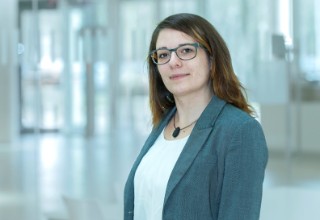Prevention through novel therapeutic approaches
Respiratory syncytial virus (RSV) usually causes mild airway infections in healthy adults. In infants, however, severe courses are frequent and have been associated with subsequent development of asthma. This relationship has not yet been scientifically elucidated, and effective treatment and prevention options are lacking to date.
Fraunhofer ITEM scientists have established a model that mimics the viral infection ex vivo in viable human lung tissue (precision-cut lung slices – PCLS for short). RSV triggers reactions in these tissue slices similar to those seen in infected patients. First results obtained with infected PCLS have shown not only a pronounced anti-viral immune response, but also activation of asthma biomarkers in the tissue, which might be a target for specific inhibition by preventive drugs.
In parallel, an interdisciplinary team in the Fraunhofer Cluster of Excellence Immune-Mediated Diseases CIMD is developing an innovative vaccine that is not only intended to protect against severe respiratory infections with RSV, but could also prevent the consequent development of asthma. To this end, inactivated virus particles are packaged in liposomes and administered into the lungs. The aim is to establish immunity directly in the airways. The scientists make use of PCLS to investigate the tolerability and immunomodulatory effects of the vaccine. Important first data on the use in humans are thus obtained and, furthermore, animal testing is systematically avoided.
 Fraunhofer Institute for Toxicology and Experimental Medicine
Fraunhofer Institute for Toxicology and Experimental Medicine